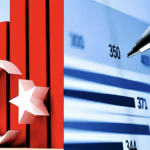The Central Bank raised the policy rate by 5 percentage points to 40 percent at the November Monetary Policy Committee meeting. After the meeting held in June, a regulation was made that the increases would affect the interest rates on credit card debts and overdraft accounts in the month following the decision. However, after last week’s meeting, the Central Bank announced that credit card interest rates, whose annual interest rate reaches 60 percent, will not be increased in December. Experts emphasized that the Central Bank’s move was aimed at eliminating the risk of a possible debt default. According to the Banking Regulation and Supervision Agency (BRSA) data individual credit card debt balance exceeded TRY 1 trillion. According to the data of the Banks Association of Turkey, as of the end of September, the number of credit card users increased by 2.8 million people to 35.8 million people and the risk per person increased to TRY 27.4 thousand.
Credit card annual compound overdue interest rate at 59.36 percent
When the new management of the Central Bank took office, the policy interest rate was 8.5 percent, while the maximum contractual interest rate on credit cards was 1.36 percent, the overdue interest rate was 1.66 percent and the interest rate on overdraft accounts was 1.66 percent. Now the policy rate has been raised to 40 percent. However, last month’s interest rates remained valid. Accordingly, the maximum contractual interest rate on credit cards will remain at 3.66 percent, the default interest rate at 3.96 percent, the contractual interest rate on cash withdrawal or overdraft accounts at 4.42 percent, and the default interest rate at 4.72 percent. These are monthly interest rates. When the annual compound interest rate is calculated, the annual compound credit card interest rate is 53.93 percent, the overdue interest rate is 59.36 percent, the overdraft interest rate is 68.03 percent, and the overdraft overdue interest rate is 73.92 percent. In case of payment below the minimum amount until the due date specified in the credit card account statement, interest is applied to the unpaid portion of the minimum amount as of the due date. 15 percent Resource Utilization Support Fund and 5 percent Banking and Insurance Transactions Tax are collected over the interest rate.
After June, both the Central Bank and Treasury and Finance Minister Mehmet Simsek frequently drew attention to retail credit card debts, and although credit card debt continued to increase, the rate of increase lost momentum as interest rate hikes were reflected and risk weights were increased. Nevertheless, in the Financial Stability Report published this month, the Central Bank pointed to individual credit card debts and the interest rate risk associated with them. In the Financial Stability Report, information on both the increase in limit utilization and statement evasion, especially in debtors below TRY 25 thousand, drew attention. In the report, it was stated that households turned to credit card usage, especially after the increase in the interest rates of consumer loans.
“A serious source of livelihood”
TOBB ETU Faculty Member Assoc. Prof. Dr. Atılım Murat emphasized that it is very important that the policy interest rate increase will not be reflected on credit cards and said, “Credit cards and cash advances are a serious source of livelihood. Despite the annual interest of up to 60 percent, those in need to continue to withdraw and postpone their statements. At some point, this situation may reach a situation where people cannot pay their debts and this creates problems both in the banking sector and socially. Therefore, the decision not to reflect the increase is very, very important.”










